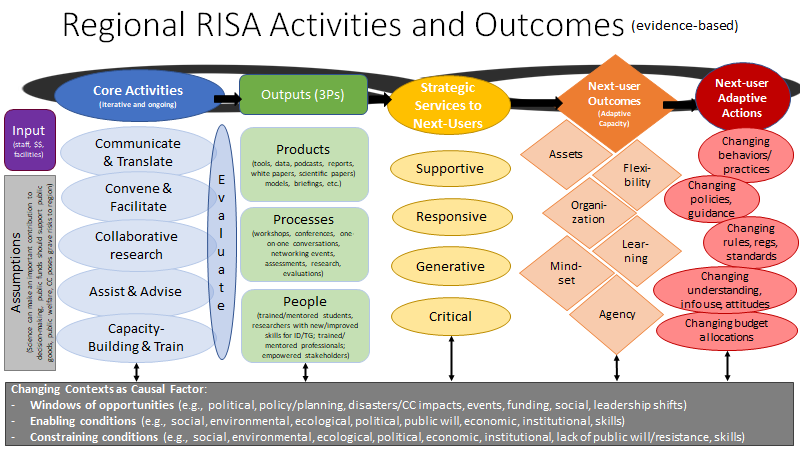Common characteristics of successful CAP/RISA teams
The CAP/RISA program has been conducting its work for over 25 years. From this experience, the CAP/RISA community and CPO CAP/RISA Program Managers have found that successful CAP/RISA teams need to balance a number of characteristics and structural elements that allow them to be successful. A successful CAP/RISA team conducts, translates and communicates research, co-develops knowledge and tools with decision makers and intermediary institutions, and iteratively engages with decision makers to support the integration of climate knowledge in planning, preparedness, response and policy efforts.


Individual regional CAP/RISA teams always begin by building and reaffirming the essential foundation of trusted relationships. Through sustained opportunities for engagement of researchers and societal partners from all relevant sectors, they learn about the needs of decision-makers, jointly identify research needs, conduct collaborative research, advise and assist, inform and support partners through complex decision challenges and in the process build partners’ capacity to take the necessary actions to adapt to weather extremes and climate change. CAP/RISA teams are partners in solution-finding.
In cases where partners already have identified potential solutions, CAP/RISA teams often are supportive of the advancement of policy and management solutions (e.g., by convening forums for dialog, through public education, training of specific users, or connecting stakeholders with each other). In other instances, CAP/RISA teams are responsive to the stakeholder needs. They may elicit or help stakeholders identify their goals/resource needs and then work to meet those needs with specific, requested outputs (e.g., to fill data gaps, develop new knowledge, or provide training). In other instances, CAP/RISA teams may open the decision space to innovative ideas and approaches (e.g., identifying new policy options, implementation strategies, creating new data/models/analysis /insights, synthesizing information in new ways that spawn new/different conversations). And finally, CAP/RISA teams may play an essential, constructively-critical role with regional decision-makers. They may inform and advance policy and management debates by being that credible, outside voice on existing/planned, but inadequate or missing approaches to dealing with current challenges (e.g., by providing commentary, evaluating implementation and outcomes).
In all these ways, CAP/RISA teams build the adaptive capacity of decision-makers, (e.g., by helping them learn more quickly, often together with partners they may not have met otherwise, increasing their flexibility, changing their attitudes and ways of thinking about problems, increasing decision-makers’ access to assets and their sense of agency). Greater adaptive capacity ultimately enables decision-makers to take necessary actions such as changing behaviors, modifying their practices, policies, plans, guidance, rules, regulations, standards, and budget allocations on the basis of better information. It is these kinds of actions that over time change communities’, households’, and entire sectors’ risks, vulnerabilities and likelihood of suffering the impacts of climate change.
Building Blocks: CAP/RISA Team Structure
CAP/RISA teams are encouraged to be innovative and diverse in their approaches to team structure, advisory mechanisms, research, and stakeholder engagement. Below are some common key components of successful CAP/RISA teams that have evolved over the years.
Program Management
- Program management staff who devote(s) time to team management, integration across projects, research and engagement with decision makers, and synthesis and reporting
Leadership
- Interdisciplinary social and physical science expertise
- Engagement with high-level decision makers
- Strategic management of team science
- Inclusion of leaders from key underserved communities
Advisory Mechanisms
- Standing advisory committees composed of key climate service partners and key community leaders provide regular feedback on regional coordination and team strategy
- Advisory committees may also sometimes be narrowly scoped to a particular topic, such as the development of a product, state readiness for a climate hazard, or the integration of justice & equity principles into the CAP/RISA team
- Other flexible advisory functions such as workshops, surveys, interviews, and informal dialogues may be performed as needed, such as a regional needs analysis in the first year of a CAP/RISA team
Research and Engagement
- Integrated approach to research and engagement projects across prominent themes
- Interdisciplinary research teams that combine research expertise with stakeholder engagement expertise. This includes representation from social, behavioral, physical, natural, engineering, communication, etc. sciences.
- Engagement practices that include:
- Dedicated experts to facilitate effective engagement techniques and incorporate engagement into all activities
- Collaborative partnerships such as linking with extension networks, state/local governments, and other intermediary organizations to reach wider groups of decision makers
Students and Young Professionals
- Support of and opportunities for early career researchers and young professionals, undergraduate, and graduate students especially in the model of use-inspired research with a heavy engagement focus
- Mentoring of this cohort by CAP/RISA investigators
Evaluation
- Experts to evaluate projects, tools and/or engagement processes
- Experts to evaluate overall impact of the team’s efforts on climate adaptation in the region
Outreach, Communication, and Translation
- Communications specialists work on graphic design, web development, translation, and media outreach
Advisory Mechanisms
- Standing advisory committees composed of key climate service partners and key community leaders provide regular feedback on regional coordination and team strategy
- Advisory committees may also sometimes be narrowly scoped to a particular topic, such as the development of a product, state readiness for a climate hazard, or the integration of justice & equity principles into the CAP/RISA team
- Other flexible advisory functions such as workshops, surveys, interviews, and informal dialogues may be performed as needed, such as a regional needs analysis in the first year of a CAP/RISA team
References
Owen G., D. Ferguson, and McMahan B. “Contextualizing climate science: applying social learning systems theory to knowledge production, climate services, and use-inspired research,” Climatic Change 2019. https://doi.org/10.1007/s10584-019-02466-x


